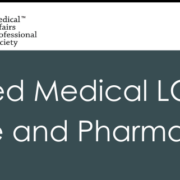Interview: Field Medical’s Broad Impact on Patients and Organizations
Ralph Rewers, Sr Director, Global Field Medical Excellence at AbbVie, shares how Field Medical professionals are in a position to impact thousands of patients. At the MAPS 2020 Global Annual Meeting, Dr. Rewers encourages Field Medical professionals to step into the shoes of the individuals they’re speaking with to better understand their beliefs and behaviors, so organizations can better tailor medical communications to how they receive scientific data.
If the video above does not play, or to view full screen, CLICK HERE to open in a new window.
Download the Presentation
Members may also download a PDF copy of the slides from the Field Medical program from the MAPS 2020 Global Annual Meeting as well as a recording of the session in the Community Portal. Not a member and wish to access the slides? Membership is only $250 USD per year ($425 for a 2-year subscription) and includes access to all new live Webinars, all on-demand Webinars (over 50 Webinars and growing each month), discussion forums to share best practices and questions with over 4,000 Medical Affairs professionals from across the globe, copies of past meeting presentations, white papers, standards & guidance tools and templates, and much, much more. Click here for membership details or to sign up: https://medicalaffairs.org/membership/







